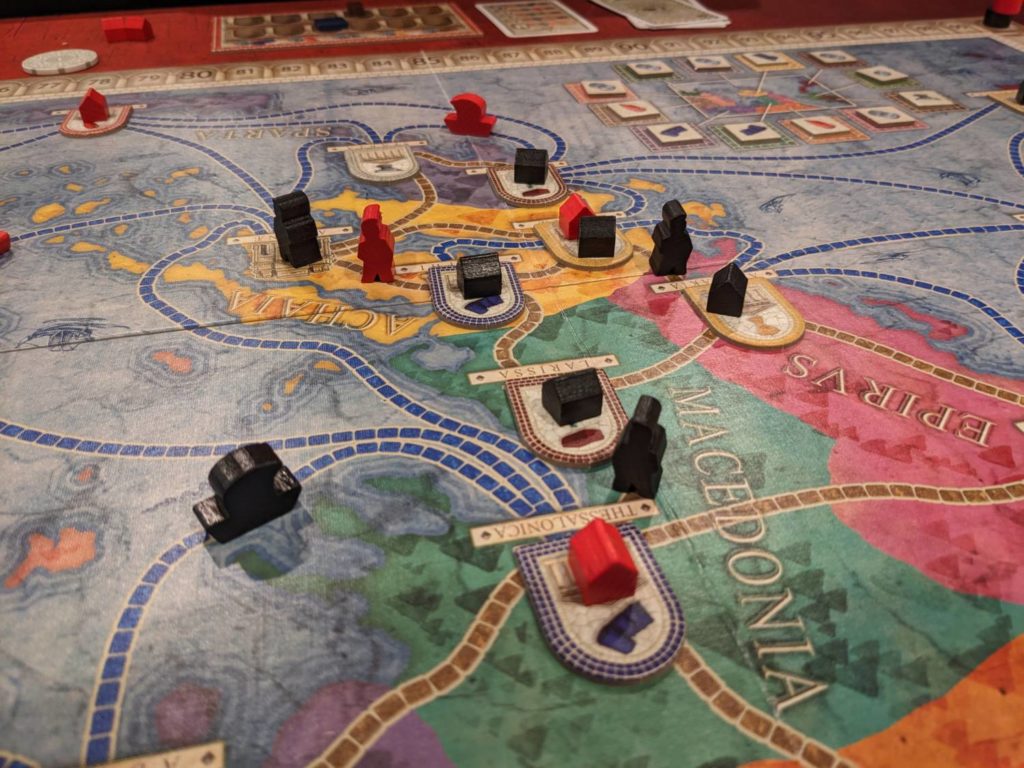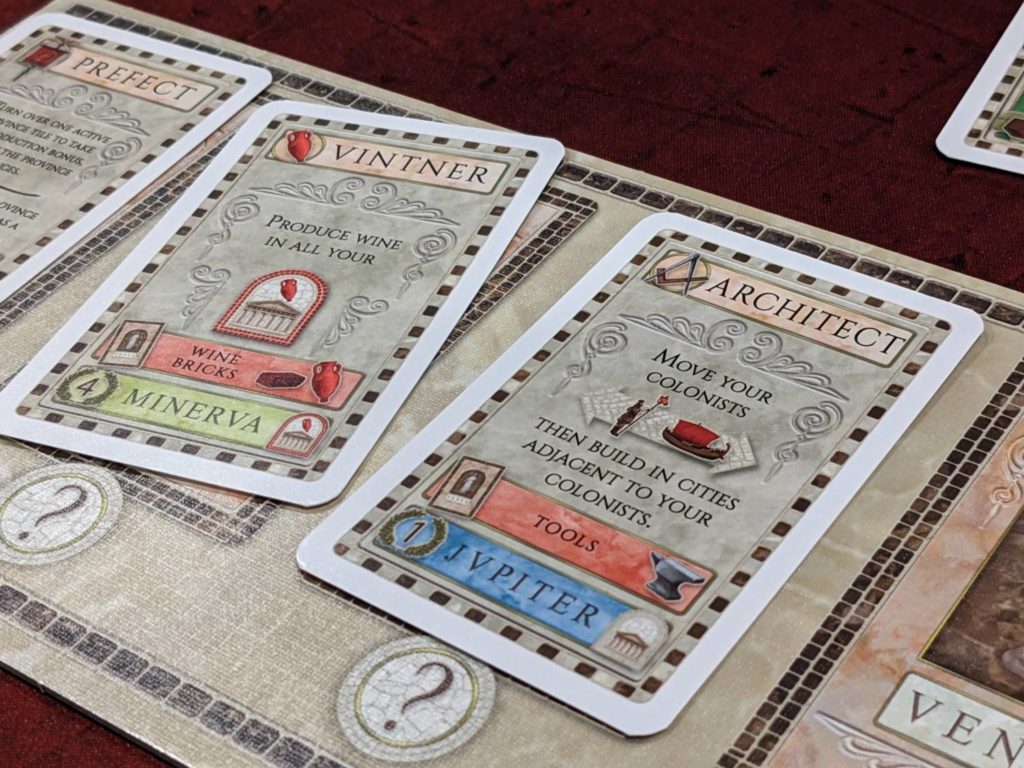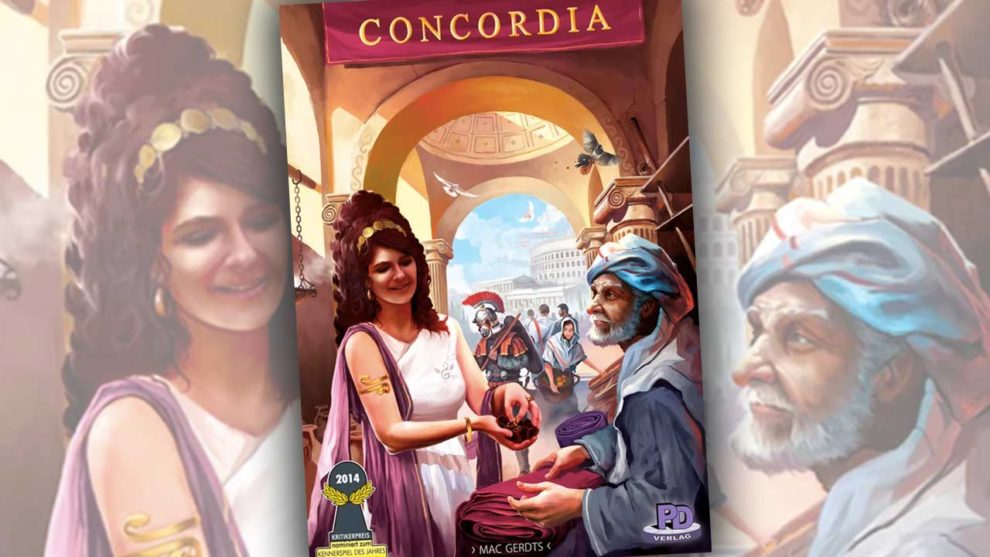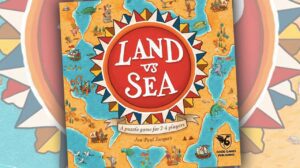At a recent game night, we needed something that could play five or six people; we had five people and we were expecting a sixth, so the usual debate resurfaced: do we play one game, or split into two groups?
Ultimately, our sixth player didn’t arrive so we bandied a number of five-player titles around that could be played in under two hours. Usually, this is known by some of my friends as “Dead Man’s Land” because it can be hard to find a game that plays relatively quickly with so many players, and not all games that play up to five people play well at their max player count.
When the smoke cleared, the host pulled out his copy of Concordia (2013, Rio Grande Games). All of us had played recently enough that we remembered the rules, so save for a few refreshers on the scoring mechanics, everyone knew what they were doing.
A funny thing happened at the end of this particular play of Concordia: a number of us looked at each other and said the same thing:
“Why don’t we play this game more often?”

Rome!
Concordia is a 2-6 player hand management game which, as of this writing, sits in the BGG top 25 games of all time. Although I am categorizing this article as a review, most, if not all, seasoned tabletop hobbyists have known about Concordia for a long time.
Players take on the role of leaders in the Roman dynasty who are tasked with growing their empire, settling in new regions, trading goods, and acquiring new cards to score the most victory points. Over the course of a series of rounds, players manage a hand that begins with seven cards and will slowly grow over the course of play. All of the game’s scoring is tied to these cards—in that way, Concordia so elegantly dictates each turn with its card action choices and its end game with those same cards.
Frankly, I was shocked during that recent five-player game at how everything you need is on a small double-sided card that serves as a player aid. The Concordia rulebook isn’t great, but the game is so easy to teach that I’m still impressed that the player aid basically runs the teach for you.
On a turn, players take an action dictated by their cards, formally known as Personality Cards. Some cards allow a player to send colonists out to settle new routes and build trading houses (Architect); others produce goods for each house in a given region (Prefect). Other cards let you buy or sell goods, copy another player’s most recent action or buy new Personality Cards. All players also have a Tribune card, which lets players recall all of their previously-played cards while also building a new colonist that is placed in Rome.

Over the course of the game, the cards don’t get that much juicier, in terms of their abilities. I love this! More often than not, hand management games, deck builders, and deck shedders make players begin a game with some terrible cards; not so in Concordia. I’ve seen games where some players don’t even bother to buy new cards for the first few rounds because they can take all of the actions they need with their starting hand. Then, those players pivot to buying cards when they have assured themselves of the strategy they really want to pursue.
The beauty of Concordia is that while the cards may or may not get markedly better for the player in terms of abilities or options, each card provides more end-game points. The only thing I really emphasize to new Concordia players is the cards—no matter what you do, you are not going to win unless you buy some more cards!
Each action card’s scoring condition is clearly listed at the bottom. Some score for end-game leftover cash (admittedly, I’ve never seen someone lean into this strategy and win). Other cards score for the number of regions where a player has presence on the map. Some reward a specialist—if someone has focused on building trading houses in wine or cloth regions, that could lead to a big payday during final scoring.
And the card scoring stacks. So, if someone has specialized in putting all six of their colonist tokens on the map, all of their “Mars” cards will score 12 points each. If a player gets four of those Mars cards into their hand, that’s a whopping 48 points! Once other players see that someone could score big in this way, I find that a “hate draft” becomes important late in the game. If my neighbor has specialized in wine production, there’s no way I’m letting them take the wine Minerva card when it hits the market!

Oh, The Places They’ll Go!!
Concordia is still one of the best game designs in history.
Every element provides a level of tension. Which card should I play first? Which card should I play, knowing that another player could copy my action? When should I take the recall action, to maximize the number of cards I’ve discarded which gives me a small sestertii (coin) bonus?
Can I afford to wait to build that next trading house, knowing that the sestertii cost will multiply by the number of other houses already there? How can I afford not to do it, if my neighbor uses their Prefect card to trigger a production in that same region, where they already have a couple other trading houses?
I really need that Consul card, because it reduces the cost of a single card on a future action…but I really hate the idea of buying only one card when I have the chance to buy two cards on a normal action. But I don’t have enough resources to buy two cards yet!!
Oh, the options! The choice of when to use your own copy card (known as the Diplomat). The way turns come together when you’ve used your Architect power to line up all of your colonists in the right spot, then you build three or maybe four trading houses on the same turn, and you do it in a way that triggers one of the end game conditions by building your 15th trading house. Or timing a Prefect move so that you can take 12 sestertii all at once, right before another player was about to do the same thing.
The moments in Concordia worked in 2013. They still work just as well in 2023. And for a game that plays up to six players, it’s amazing that you can get a full game completed in just 90 minutes if everyone knows how to play.
Given the depth of the decision making, Concordia is still a home run. Well…mostly.
I played Concordia a couple more times for this review, specifically at two players. Here’s the Achilles heel for Concordia: it doesn’t play as well at lower player counts. In fact, I’m not sure I will ever choose to play Concordia again with less than four players.
That’s because the above-mentioned tension goes away with only two players on even the smaller maps. Concordia isn’t as interesting as a race to empty the card market or build your 15th house with a single opponent. There will always be places to build with only one opponent, and often, trading houses will be built on empty spaces, meaning that you will only have to pay regular prices in sestertii to establish trade routes.
It also feels easier to take your time on snatching the cards that you want. When you only have to worry about one other player, you can regularly size up the competition and it’s easy to remember which cards that player has in hand for planning purposes. My experience is that Concordia is best at the highest player counts.
Concordia continues to reside on the list of all-time greats because it is so accessible. I look forward to continued plays for years to come!












Wow! Great review of a great game.
My friend Steve introduced this game to my wife and I. I dove in and started to examine things, trying to parse out the best strategies and the like. My wife has taken a much more relaxed approach. Obviously, she kicks my butt almost every time we play. 🙂
This is one of those games where, just shifting the map a bit, changes so much of how you approach the game. In a game like ‘Ticket to Ride’, changing the board does not so much shift the game as much as provide opportunities to include new rules, new components, and so on. With all of these things added together, each map is a grand new experience.
But Concordia? Make a new map, and you are in a new world. Do not add a single new rule, or a new component. Such things are just not a requirement to breathe new life into the game. Steve, my wife, and I all have different favorite maps to play. That said, if someone wants to play this game, I do not care which map we chose: I am ready. Just point me to the table and give me my yellow men and ships.
That said — I whole-heartedly agree: playing at two players removes so much of the tension in the game. Three is a good game… but once you reach four, this game is Nirvana!